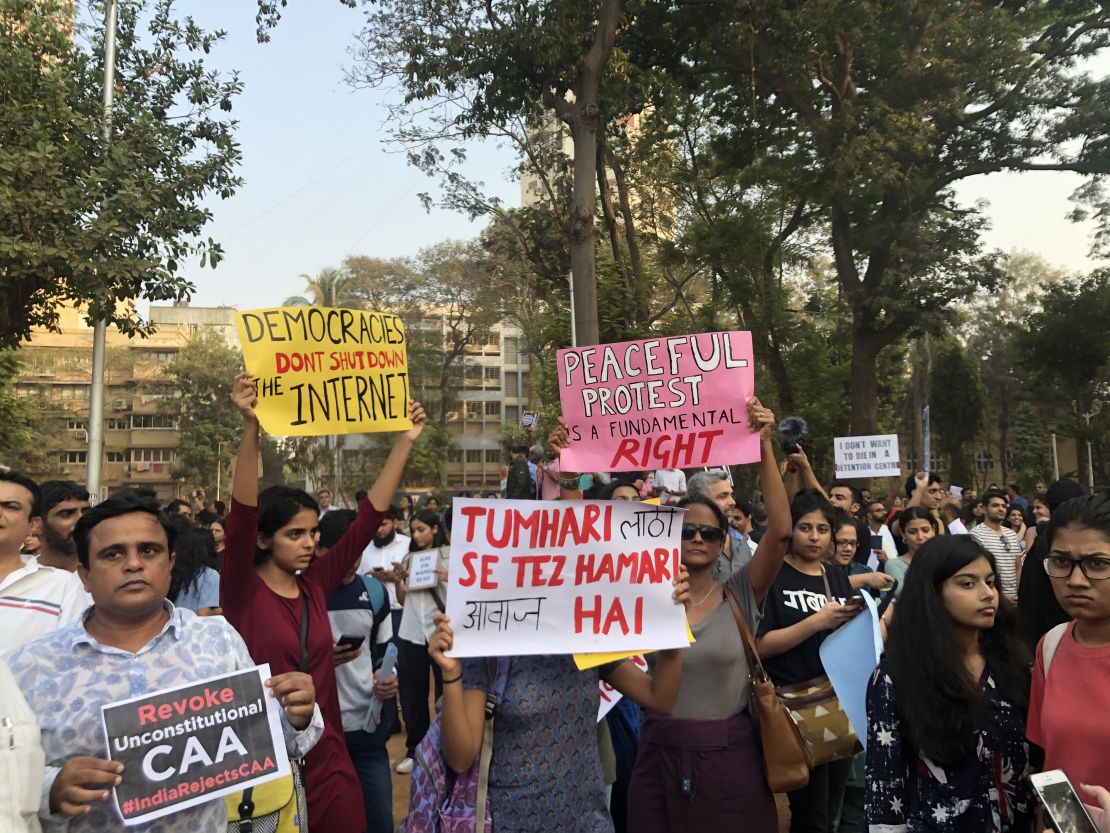Editor’s Note: Akanksha Singh is a journalist based in Mumbai, India. She covers politics and social justice and has written for the BBC, The Independent and South China Morning Post, among others. Follow her on Twitter @akankshamsingh. The views expressed in this commentary are her own. View more opinion on CNN.
Across India, people are protesting the implementation of the Citizenship Amendment Act, (CAA) after the bill was passed in both the country’s upper and lower houses of Parliament. The CAA grants fast-tracked citizenship to undocumented migrants from the “Hindu, Sikh, Buddhist, Jain, Parsi or Christian community from Afghanistan, Bangladesh or Pakistan, who entered into India on or before the 31st day of December, 2014.”
Muslims are left out.
The government’s informal reasoning here is that the countries listed in the CAA are Muslim-majority countries. Minority religions, who are more likely to face persecution in their home countries, therefore deserve fast-tracked citizenship. The Chief Minister of Gujarat summarized this sentiment when he said, “Muslims have 150 countries where they can live, but for Hindus there is only one country, and that is (India).”
However, according to the Indian Constitution, India is a “sovereign socialist secular democratic republic.” Including religion as a criterion for citizenship in a secular democracy like India is fundamentally unconstitutional.
But the CAA isn’t just a danger to those it seemingly chooses to leave out – it’s a threat to all Indian citizens. It seeks to redefine what it means to be an Indian through a new lens, notably one in which public dissent and the right to protest will not be tolerated.
Since the act’s passage, a number of protests have erupted across the country, from major cities like New Delhi, Mumbai, Chennai and Bengaluru, to smaller towns like Chaygaon, Meerut and Bijnor. To limit further protests, the government has implemented curfews and shutdown internet services in several cities, including New Delhi. At least 22 people have died.

The CAA also opens old wounds – specifically the human cost of Indian independence from the British, which came in the form of partition, the violent separation of India and Pakistan in 1947. Pakistan chose to become an Islamic Republic, while India became a secular one. In doing so, many Muslims and Hindus on each side of the border fled to the side they felt safest on.
Still, despite the border movements, India today is home to the second-largest Muslim population globally. And the safety Muslims were promised in young and independent India is once again under threat.
The Bharatiya Janata Party, which Prime Minister Narendra Modi leads, insists this act is not “anti-Muslim,” but this follows a dangerous pattern in the BJP, which has made no effort to distance itself from its Hindu nationalist agenda. Many members of the BJP advocate for “Hindutva,” a principle that aims to define Indian culture through Hindu values.
More specifically, the CAA comes after the National Register of Citizens (NRC) in the northeastern state of Assam, which rendered 1.9 million people stateless several years back. According to The New York Times, the majority of people unable to prove their citizenship in Assam are Muslim. It also follows the government stripping autonomy from Kashmir, the only Muslim-majority state, and several Hindu nationalist parties implementing the beef ban. (Beef was, until the ban, a cheap option for several minorities including Muslims and Dalits.)
And earlier this month, the BJP’s Twitter account deleted a tweet from November of this year which said, “We will ensure the implementation of NRC in the entire country. We will remove every single infiltrator from the country, except Buddha, Hindus, Sikhs: Shri @AmitShah #NaMoForNewIndia.”
Not surprisingly, Indians have finally taken to the streets to say, “Enough.” We are not a people who will stand for this divisiveness. And despite bans on protesting in several states, the protests continue.
The Indian people want their government to know that they can and still need to be held accountable. On December 19, I partook in a protest at Gowalia Tank Maidan – the same park from which Mahatma Gandhi started the Quit India Movement in 1942.
As people chanted “Hindu-Muslim ek hai, Modi-Shah fake hai!” (“Hindu-Muslim are one, Narendra Modi and Amit Shah are fake!”) and “Inquilab Zindabad” (“Long live the revolution”), I saw the real India: one of unity. In a sea of protesters with signs that compared detention camps for undocumented immigrants to concentration camps (the majority of people awaiting to be deported are Muslim), and the BJP to the Nazis, I saw volunteers who formed human chains to ensure women could move in and out of the protest grounds with ease, and strangers sharing water in the afternoon sun.
It is growing increasingly apparent that the BJP government is trying to build a Hindu nation. And the cost is clear. But why now, when the Indian economy is on the brink of a growth recession?
Today, the BJP comes after the tribal peoples of Assam, the Dalits and the Muslims, and says the CAA welcomes the Hindus, Sikhs, Parsis, Jains and Christians – but have we any guarantee that it will stop there?
As the rest of the world looks on, Indians know that we’re at a pivotal point that will decide the future of Indian democracy. We’ve been here before. We’ve sat in the same parks and walked the same paths as those who fought for Indian freedom to begin with – and we’ve won.
We can do it again.






